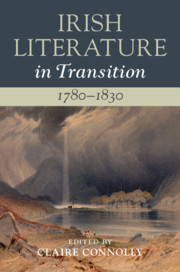Book contents
- Irish Literature in Transition, 1780–1830
- Irish Literature in Transition
- Irish Literature in Transition, 1780–1830
- Copyright page
- Contents
- Contributors
- Series Preface
- General Acknowledgements
- Acknowledgements
- Introduction
- Part I Origins
- Part II Transitions
- Part III Reputations
- Chapter 8 Placing Mary Tighe in Irish Literary History: From Manuscript Culture to Print
- Chapter 9 Edgeworth and Realism
- Chapter 10 Lady Morgan and ‘the babbling page of history’: Cultural Transition as Performance in the Irish National Tale
- Chapter 11 ‘The diabolical eloquence of horror’: Maturin’s Wanderings
- Chapter 12 English Ireland/Irish Ireland: the Poetry and Translations of J. J. Callanan
- Chapter 13 Thomas Moore and the Social Life of Forms
- Chapter 14 ‘English, Irished’: Union and Violence in the Fiction of John and Michael Banim
- Chapter 15 The Transition of Reputation: Gerald Griffin
- Chapter 16 William Maginn: the Cork Correspondent
- Part IV Futures
- Index
Chapter 16 - William Maginn: the Cork Correspondent
from Part III - Reputations
Published online by Cambridge University Press: 28 February 2020
- Irish Literature in Transition, 1780–1830
- Irish Literature in Transition
- Irish Literature in Transition, 1780–1830
- Copyright page
- Contents
- Contributors
- Series Preface
- General Acknowledgements
- Acknowledgements
- Introduction
- Part I Origins
- Part II Transitions
- Part III Reputations
- Chapter 8 Placing Mary Tighe in Irish Literary History: From Manuscript Culture to Print
- Chapter 9 Edgeworth and Realism
- Chapter 10 Lady Morgan and ‘the babbling page of history’: Cultural Transition as Performance in the Irish National Tale
- Chapter 11 ‘The diabolical eloquence of horror’: Maturin’s Wanderings
- Chapter 12 English Ireland/Irish Ireland: the Poetry and Translations of J. J. Callanan
- Chapter 13 Thomas Moore and the Social Life of Forms
- Chapter 14 ‘English, Irished’: Union and Violence in the Fiction of John and Michael Banim
- Chapter 15 The Transition of Reputation: Gerald Griffin
- Chapter 16 William Maginn: the Cork Correspondent
- Part IV Futures
- Index
Summary
William Maginn made the transition from a learned Cork schoolmaster corresponding anonymously with British periodical editors to one of the central figures of the London press. He began by writing gratis for Blackwood’s Magazine, and then, fearful of the ‘cheerless prospect’ of Cork in the ‘Captain Rock’ years, moving to London as a working professional. While he avoided the trap of writing chiefly on the ‘Irish question’ as some expected, he was enveloped in the persona of ‘Morgan Odoherty’, a comic Irish figure invented in Blackwood’s by others. Maginn and Odoherty for some became one – a similar situation to that faced by James Hogg with the ‘Ettrick Shepherd’. In his last fifteen years, Maginn used multiple periodicals to both practise the art of humbug and attack, especially in politics, the humbugs of the age. His founding in 1830 of Fraser’s Magazine for Town and Country was his central innovation in literary magazines and Tory politics during the Reform era.
- Type
- Chapter
- Information
- Irish Literature in Transition, 1780–1830 , pp. 306 - 320Publisher: Cambridge University PressPrint publication year: 2020

